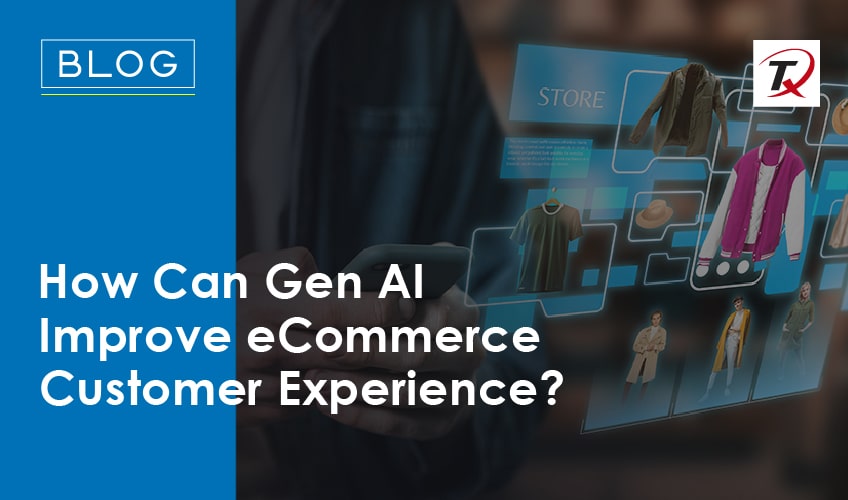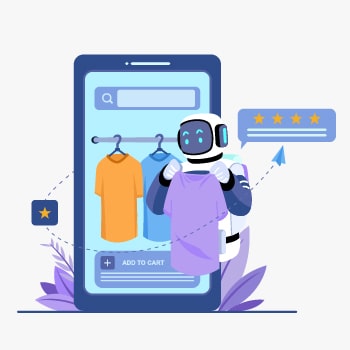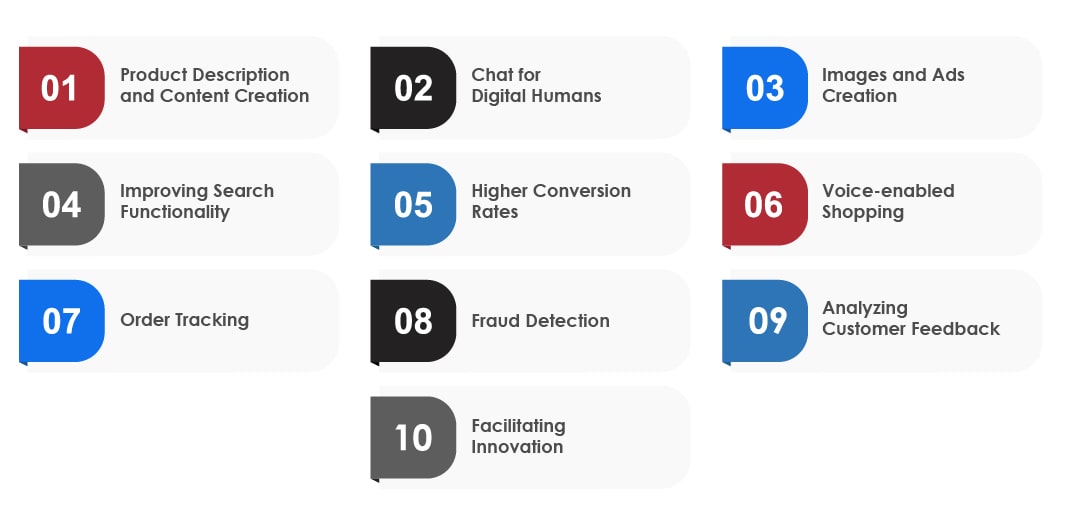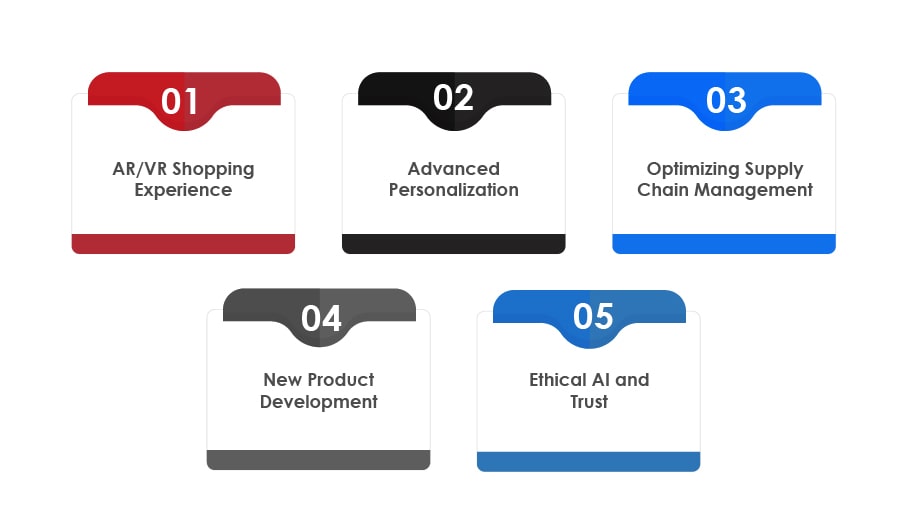Recommended Blogs
How Can Gen AI Improve eCommerce Customer Experience?

Table of Contents
The eCommerce industry is rapidly changing, and Gen-AI is one of the leading forces behind this development. By leveraging this technology, businesses generate unique content in just a few seconds. Whether creating product descriptions, image creations, or generating ideas for new merchandise, Gen AI in the eCommerce industry is at the center. By 2030, the value of the Gen AI sector is expected to grow to $110.8 billion. 80% of retail and eCommerce businesses plan to or currently use AI technologies like chatbots in their daily operations. This integration is driven by AI’s ability to handle huge datasets, facilitating a customer-centric approach to enhance the shopping experience.
Brands leveraging AI to deliver tailored customer services see up to a 40% increase in revenue, as this level of personalization drives sales and customer satisfaction. Moreover, the exponential growth of eCommerce is driven by the changing customer preferences and integration of innovative technologies like Gen AI.
Gen AI in the eCommerce Industry

Integrating AI is necessary in the current digital age to stay competitive and meet the demands of tech-savvy consumers. As the eCommerce sector consistently adopts cutting-edge technologies like Gen AI and ML, it has become a point of interest for key stakeholders. It includes entrepreneurs and solution providers analyzing the opportunities these technologies can bring to the eCommerce industry. One primary benefit of Gen AI is it allows personalized product recommendations. By analyzing past purchases, user preferences, and browsing history, AI algorithms can predict the next purchase that a customer might make. This level of personalization improves the shopping experience and increases the chances of sales.
Beyond personalized recommendations, Gen AI also offers benefits in inventory management. Gen AI also helps inventory management by predicting product demand and preventing overstocking or stockouts. This precision cuts overhead costs and ensures customers find the products they need, thereby avoiding potential loss of sales. AI integration in eCommerce operations streamlines various backend processes like logistics, pricing strategies, and procurement. It results in cost savings and improved operational efficiencies, which can benefit customers through discounts and better CX.
10 Ways Gen AI Improves eCommerce CX

Leading businesses like eBay, IKEA, and Amazon are adopting this technological change by deploying Gen AI within their operations. They aim to improve profitability and enhance brand value by offering tailored customer services and optimizing CX. The following are some areas where eCommerce businesses are leveraging the benefits of Gen AI
Product Description and Content Creation:
Browsing online stores sometimes feels like a never-ending digital wormhole with countless products. This is why a concise but descriptive product description is necessary. Although these descriptions are written by writers who research, draft interactive content, and incorporate SEO keywords, this approach sometimes leads to inconsistent product descriptions and declining customers and sales. However, with Gen AI technology, they can standardize descriptions across sellers and online retail platforms. For instance, a platform called Phrasee can analyze product features to generate descriptions. It can also create email subject lines or push notifications, enhancing CX and saving time for eCommerce brands with personalized and automated content.
Chat for Digital Humans:
Platforms like ChatGPT can generate content for digital avatars to personalize and improve customer engagement. Brands use tools like Microsoft Whisper API to improve speech-to-text accuracy so that it can function at the level of humans. Using conversational commerce capabilities, eCommerce businesses can better answer order status questions in real-time and offer personalized shopping recommendations.
Images and Ads Creation:
Generative adversarial networks (GANs) are a subcategory of Gen AI that helps create product images, which benefits the eCommerce sector. Once trained by injecting existing product images, GANs can generate realistic product visuals for eCommerce promotional activities. It saves time and resources required for product photography and editing. For instance, Nestle utilized an AI-enhanced rendition of a Vermeer painting to promote its yogurt brands, while Mattel is leveraging Gen AI technology to create images for toy design and ad creation.
Improving Search Functionality:
Gen AI improves site search engine functionalities by analyzing the complexities of human language to process and respond to queries with high accuracy. It ensures customers can easily find what they seek, reducing frustration and cart abandonment rates.
Higher Conversion Rates:
Gen AI’s most significant benefit in the eCommerce industry is its ability to enhance conversion rates. Businesses that invest in AI experience a 15% revenue increase and a 20% improvement in sales ROI. Gen AI can identify customer preferences, similarities, and patterns by analyzing users’ purchases and browsing history. This allows businesses to create better marketing campaigns and relevant product suggestions, effectively influencing purchase decisions.
Voice-enabled Shopping:
Integrating Gen AI with voice assistants opens new doors to an enhanced shopping experience. It allows users to make purchases swiftly using human language. AI analyzes spoken requests and navigates through product catalogs to seamlessly process the user journey. It facilitates a hands-free shopping experience, allowing users to interact with and buy on eCommerce platforms smoothly. Also, the AI-enabled voice-activated transaction process offers customers an intuitive and efficient shopping process.
Order Tracking:
Gen AI optimizes order tracking by offering a proactive system. It analyzes historical shipping data and real-time logistics data to predict delivery times accurately. This, in return, facilitates proactive customer engagement, real-time shipment status updates, and delivery windows. It utilizes NLP to understand and respond to queries regarding order status, thus improving CX. Gen AI can also optimize shipping routes by analyzing traffic data to ensure timely deliveries. Order tracking powered by Gen AI helps enhance CX by offering transparency and mitigating delivery challenges.
Fraud Detection:
AI systems can analyze patterns and identify anomalies in transaction data to indicate fraudulent activities. By identifying and catching these early, AI protects customer interests and business revenue, enhancing trust and security in the shopping environment.
Analyzing Customer Feedback:
Gen AI gathers customer feedback from diverse sources, including social media and reviews. It identifies sentiments, product attributes, and themes that customers highlight. Gen AI extracts and analyzes such data to offer valuable insights that eCommerce businesses can utilize to improve marketing strategies and enhance product quality.
Facilitating Innovation:
In the competitive digital business environment, Gen AI allows businesses to stay competitive by offering innovative and relaxing online shopping experiences. For instance, online fashion stores can use Gen AI to customize clothing options, enabling shoppers to design their own clothes, etc. This type of functionality greatly improves the CX level.
Future of Gen AI in eCommerce

Gen AI’s future in eCommerce is further enhancing online shopping through more advanced, intuitive, and seamless interactions. As AI technology evolves, businesses can anticipate more immersive and personalized CX.
AR/VR Shopping Experience:
AR and VR technology and AI will make the shopping experience more immersive and interactive. For example, a Gen AI-enabled AR App can allow customers to visualize furniture in their space before buying. This would allow customers to make more informed purchase decisions.
Advanced Personalization:
Gen AI will deliver more sophisticated personalization by learning from various data points, such as mood, tone, context, etc. It will enable eCommerce businesses to offer hyper-personalized CX that adapts to user preferences and behavior in real-time.
Optimizing Supply Chain Management:
Gen AI can help in efficient supply chain management by facilitating accurate demand forecasting, optimizing inventory, and figuring out potential supply chain disruptions before they become worse.
New Product Development:
Gen AI will help design new products or improve current product quality depending on customer preferences and market trends. It would speed up the development process and reduce failure risk.
Ethical AI and Trust:
Customers nowadays know AI’s role in online shopping. So, maintaining trust and transparency will become highly important. eCommerce businesses should focus on ethical AI practices to ensure their systems are fair and respect customer privacy.
>Summary
Gen AI allows eCommerce businesses to use AI to improve CX and enhance their operational efficiencies. Current uses include generating unique content like product descriptions, personalized marketing, and improving efficiency and customer engagement. However, there are certain challenges in integrating Gen AI into the eCommerce sector, such as continuous monitoring of the output, analyzing business impact, etc. Also, integrating AI solutions into existing processes can be complex and costly, which could raise concerns regarding data handling, security, and legal use. Tx addresses these challenges by implementing E2E testing processes and data management services, supporting eCommerce businesses of all sizes.
Why Partner with Tx for Gen AI Testing?

Partnering with Tx for Gen AI testing will allow your eCommerce business to smartly and securely benefit from AI technology. Our E2E testing services are designed to validate that your Gen AI system is trustworthy, secure, and aligned with your business objectives. Here’s why you should partner with Tx for Gen-AI testing:
• Our AI testing specialists have 30+ years of collective experience to ensure your Gen AI implementation succeeds.
• We use our in-house accelerators, such as Tx-Reusekit, Tx-IaCT, Tx-PEARS, etc., to thoroughly analyze your Gen AI apps for performance, security, accuracy, and trustworthiness.
• Our team has over 100 test consultants specializing in next-gen testing tools to address evolving AI testing challenges.
• Our toolkit includes advanced simulation environments, test automation frameworks, and bespoke tools developed in-house.
• We prioritize data security to ensure your Gen AI systems comply with data standards and regulations like GDPR, PCI DSS, etc. This helps maintain customer trust and protect sensitive information.
• Our tailored AI solutions align with business needs, like enhancing customer service through chatbots, optimizing inventory with predictive analysis, etc.
To know more, contact our QA experts now.
Discover more
Stay Updated
Subscribe for more info
